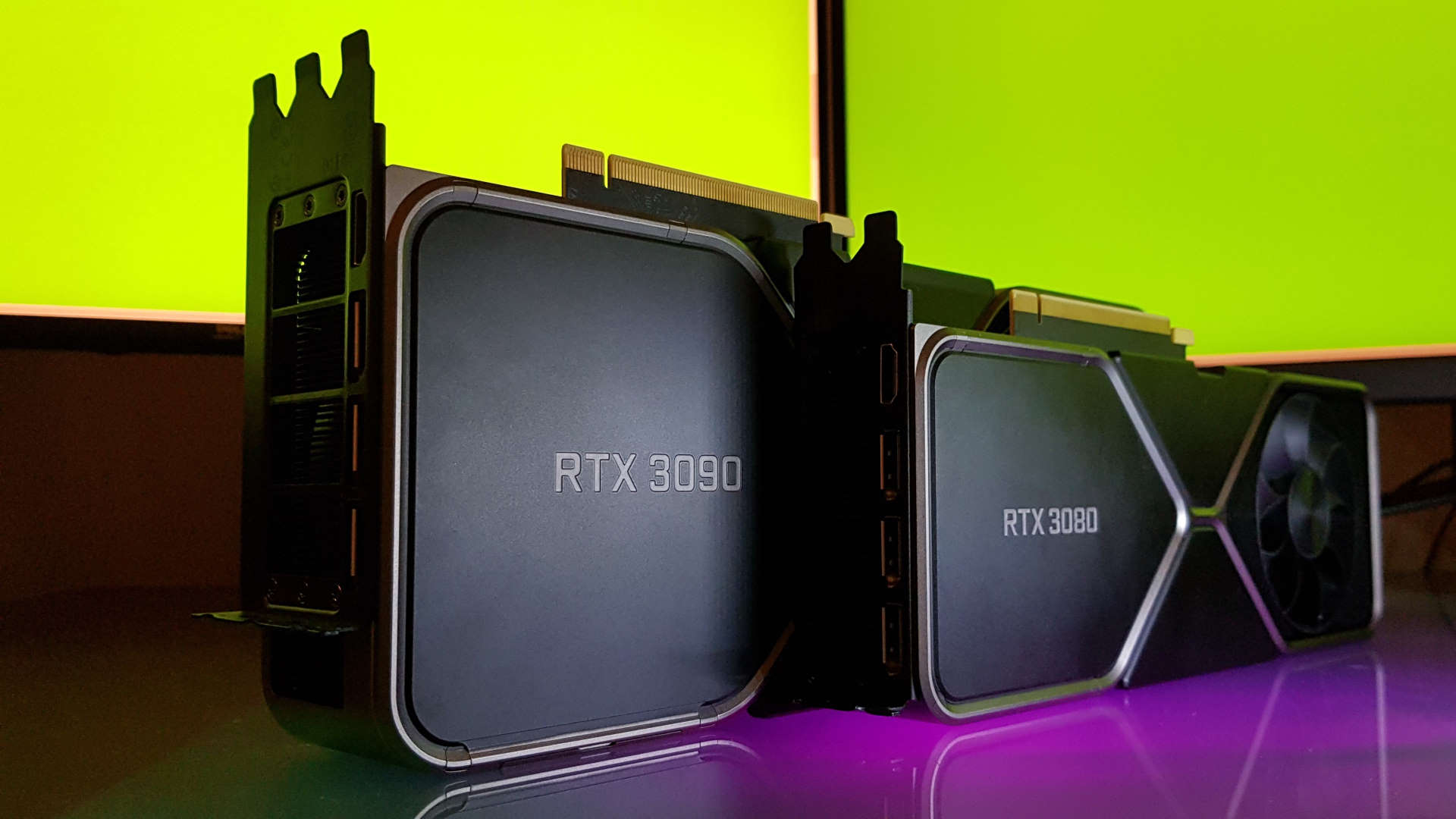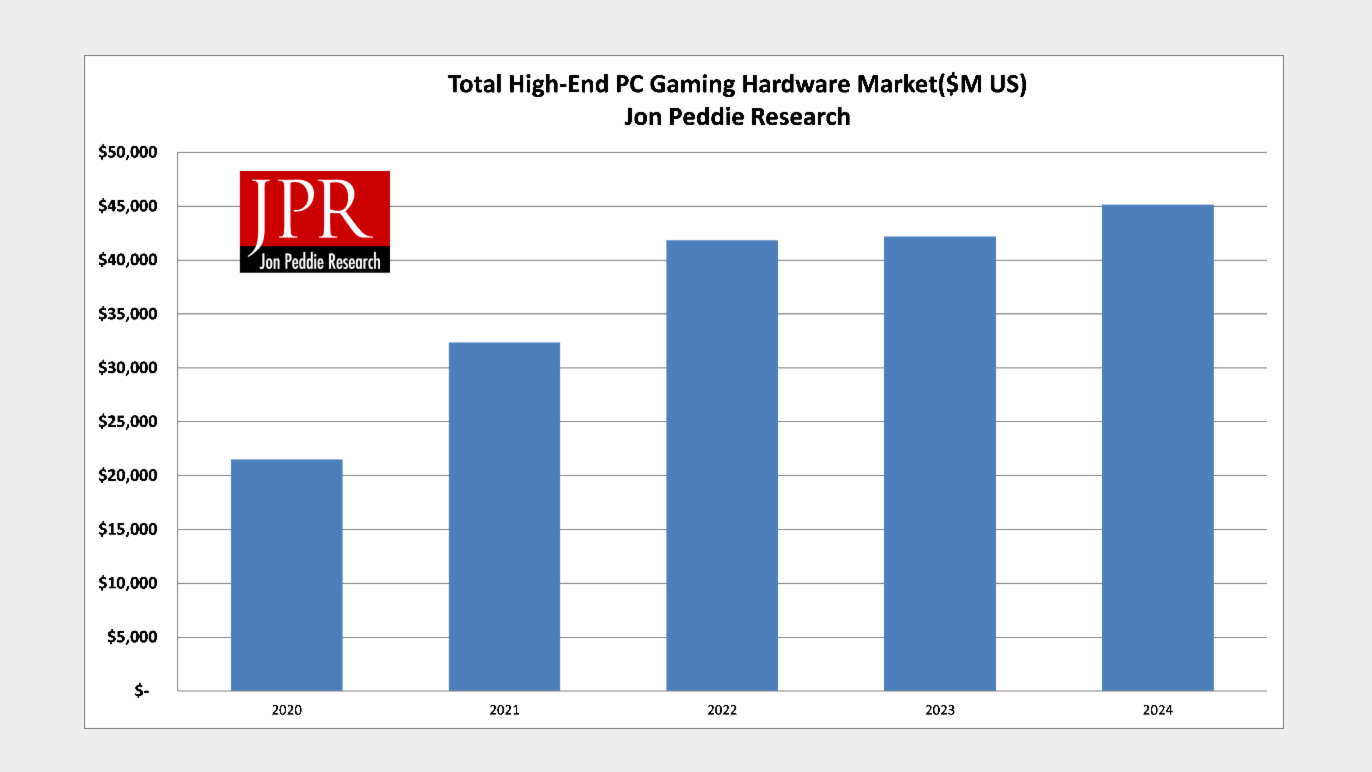As the GPU supply crisis eases it's budget PC gamers who could suffer
PC gaming analysts are predicting a recovery from supply problems, but at the high end only.

Updated July 15 with extra comments from Ted Pollack, senior analyst at John Peddie Research.
High-end PC gaming is going to be in rude health as it recovers from the supply problems that have beset our hobby over the last 18 months. There is a certain note of optimism in the latest PC gaming hardware report from noted analyst firm, Jon Peddie Research, hailing this recovery as something to be celebrated.
And yes, the prospect of actually being able to pick up a new high-end graphics card will undoubtedly be a welcome one for many a silicon-starved PC gamer. JPR is predicting steady growth for the high-end hardware market to a high of $45 billion in 2024 from a starting point of a little over $20 billion in 2020.
Hooray, then. The drought will soon be over and we can all be content that the graphics card of our dreams will only ever be a click away and not at the end of a stream of bots and a massively inflated sticker price on ebay.

Except there is also a heavy note of warning in the introduction to this report too, noting about the supply problems that:
"Gamers with average budgets could not always get what they needed, and new entrants sometimes put off, or even worse, abandoned the platform or hobby adoption. New entrants are very important to the long-term health of any gaming platform. A stark warning to hardware companies in the PC Gaming space that long-term growth is dependent on having products available and priced within reach of mass-market consumers."
And modern high-end GPUs most certainly aren't priced within reach of the vast majority of us.
Keep up to date with the most important stories and the best deals, as picked by the PC Gamer team.
If you're trying to find a mid-range graphics card you're out of luck right now. As companies fight to get a semblance of stock on the shelves they're focusing on the high-margin, high-end cards, because they know those will sell. And because, y'know, capitalism.
Almost every day on r/nvidia there's another shot of shelves in Micro Center or Best Buy filled with either GeForce RTX 3080 Ti or GeForce RTX 3090 cards, neither of which you could call 'within reach' in anything but a physical sense.
This might not just be a short term situation either. Head honcho of JPR, Jon Peddie himself, stated that, because "High-End graphics cards (Add-In Boards) maintain MSRP well and can be sold as Mid-Range products for years after production. This may encourage manufacturers to aggressively stock High-End inventory levels to prevent what we saw happen since COVID-19 lockdowns were initiated."
Which could be all kinds of concerning for those of us who can't afford to spend $700+ on a new GPU and have come to rely on mainstream heroes like the AMD Radeon RX 5500 XT or GeForce GTX 1650 Super for our gaming rigs.
Traditionally those sorts of sub-$200 graphics cards have been the volume plays for manufacturers, the ones made in greater numbers because they always sold in greater numbers too. But if manufacturers start hedging their bets on future supply issues by overstocking high-end GPUs instead, budget PC gamers are going to be left out in the cold.
Extra comments from JPR
However Ted Pollak, the author of the report, elaborated on his thoughts to us, stating that JPR is predicting "additive stocking of inventory at the high-end... not at the expense of the mid-range segment."

Best CPU for gaming: the top chips from Intel and AMD
Best graphics card: your perfect pixel-pusher awaits
Best SSD for gaming: get into the game ahead of the rest
Maybe manufacturers will aggressively stock high-end graphics cards as well as the more affordable GPUs, but if the current stock shortage has taught us anything it's that if there are only high-end options available, that's what gets bought. Those would be dangerous learnings however, and potentially ruinous ones for the hobby if manufacturers took that short term effect as a permanent state of affairs.
But it also feels like something that's coming from the top down. Where are the RTX 3050 or RX 6600 cards from Nvidia and AMD, for example? When you have a finite number of GPUs you can manufacture with Samsung and TSMC respectively—and all the expensive, high-margin ones you make are selling out—you're not going to take a chunk out of that supply to instead make the same number of cheaper cards.
Pollak reiterated Peddie's statement that "the high-end cards, if they don't sell, can be sold as mid-range cards a year or more later. This will buffer things a bit. It may affect the margin of the company a little on the GPU part of their business, but if they can't supply all the parts needed in a crunch then their whole business margin is in trouble."
Which does make sense from a long-term viewpoint. But it bears remembering what happened the last time there was a GPU shortage and Nvidia and AMD boosted the supply of cards to compensate. Both were left holding a whole lot of unwanted GPUs when the crypto demand tailed off, and that pushed back subsequent generations quite a way while they tried to drive down stock levels.
Whether the manufacturers will be willing to hold on to extra high-end stock beyond the launch of the next generation GPUs remains to be seen. Certainly that wasn't the approach the last time around.
But times are different now; precisely how different I guess we'll see when the true mainstream GPUs from this generation do launch. If there is ample stock of those alongside high-end cards we'll know that manufacturers are willing to take the potential hit.
In the end though, when the supply shortage is over, it's still going to take a while for the industry to normalise to the benefit of PC gamers with limited budgets. Well, fingers crossed it does eventually normalise anyway.

Dave has been gaming since the days of Zaxxon and Lady Bug on the Colecovision, and code books for the Commodore Vic 20 (Death Race 2000!). He built his first gaming PC at the tender age of 16, and finally finished bug-fixing the Cyrix-based system around a year later. When he dropped it out of the window. He first started writing for Official PlayStation Magazine and Xbox World many decades ago, then moved onto PC Format full-time, then PC Gamer, TechRadar, and T3 among others. Now he's back, writing about the nightmarish graphics card market, CPUs with more cores than sense, gaming laptops hotter than the sun, and SSDs more capacious than a Cybertruck.

